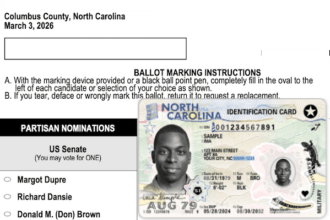Several new bills became law Jan. 1, while others are still on hold pending litigation.
Several of the new laws went on the books after the Republican-dominated legislature overrode vetoes by former Gov. Roy Cooper. The former governor vetoed more bills than all other of the state’s governors combined. The gubernatorial veto was passed into law in 1996.
Among the changes to the state law books this year:
- Personal income taxes will be lowered to 4.25 percent from 4.5 percent for 2025, and future decreases will follow annually. Rep. Brenden Jones of Columbus County was one of the leaders of the state’s tax reform plan, which aims to reduce the tax burden on working families.
• Under House Bill 834, youth ages 16 to 18 who commit certain violent crimes can now be immediately charged as an adult, instead of going through a judicial hearing to determine if the harsher penalties can be applied. For most crimes the same youth will be considered delinquents and charged through the juvenile justice system. Children ages eight through 10 can be charged as delinquents for certain felonies. - Due to the rising costs of medical care and automobiles, liability insurance for all drivers will rise slightly, with liability-only drivers seeing an increase of several dollars a month. The state increased minimal coverage from $30 to $50,000 per person and $60 to $100,000 per wreck under Senate Bill 452.
- House Bill 488 raises the cost of residential projects requiring a general contractor to $40,000. The bill also blocks the State Building Code council from altering the building code until 2031. Cooper sued the legislature over freezing changes to the building code. That case has not been heard in court.
- A major omnibus bill, Senate Bill 382, provides more relief funding for hurricane victims, as well as a number of administrative changes. Part of the bill however, is making its way through the courts. Cooper sued the General Assembly over provisions in SB. 382 that strip the governor of much of his power over the state and local elections boards. Those duties would be passed on to the state auditor, who is now a Republican. While the funding and administrative changes have gone into effect, the elections boards rules are hold pending the lawsuit. New Governor Josh Stein, who filed the lawsuits as Attorney General, and his successor, Democrat Jeff Jackson, have promised to continue with the suits.
- Also, Senate Bill 607 requires ticket sellers through companies like EventHub and Ticketmaster to make all fees known up front, rather than adding them to the end of a ticket purchase. The bill came about after some businesses were reportedly charging five and six times the face value of tickets in fees and additional charges, after the customer had purchased a ticket.







